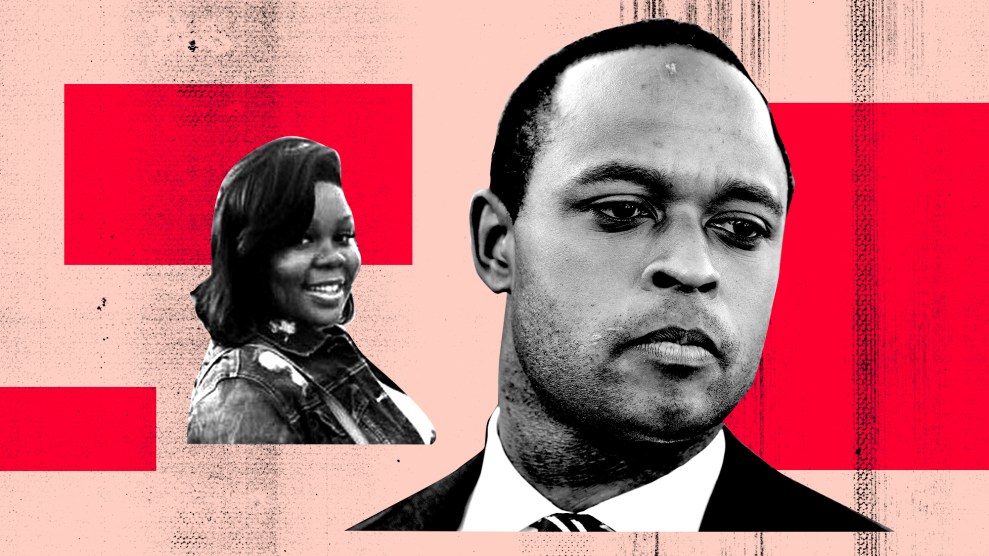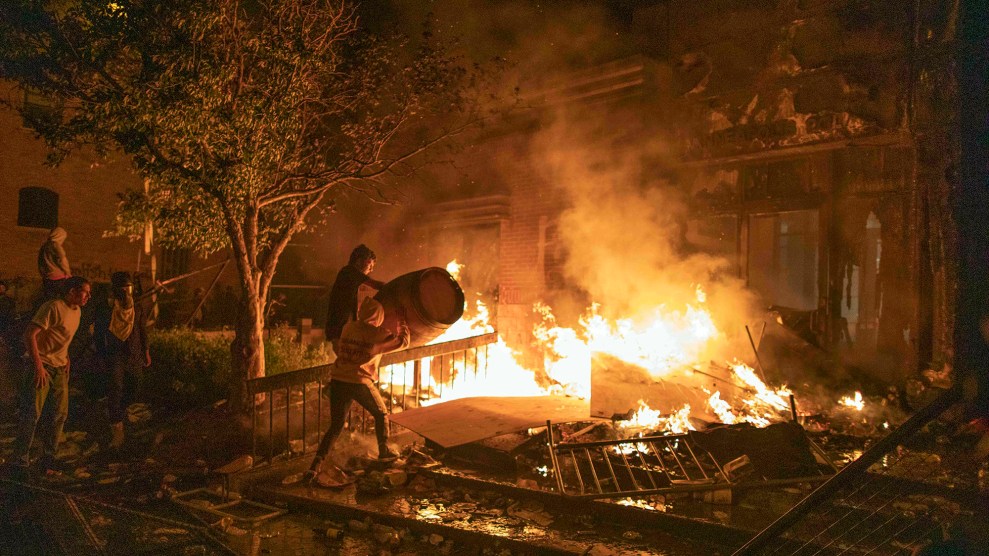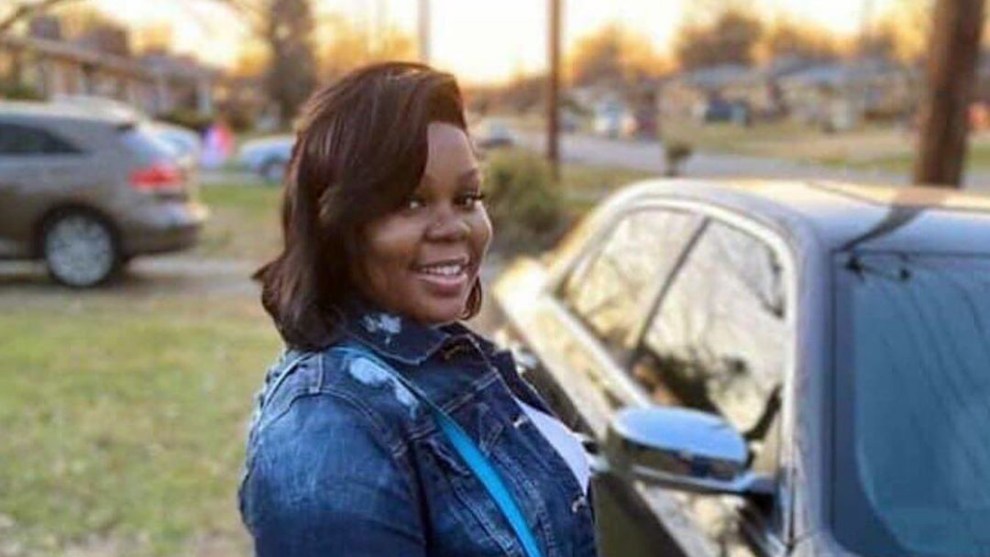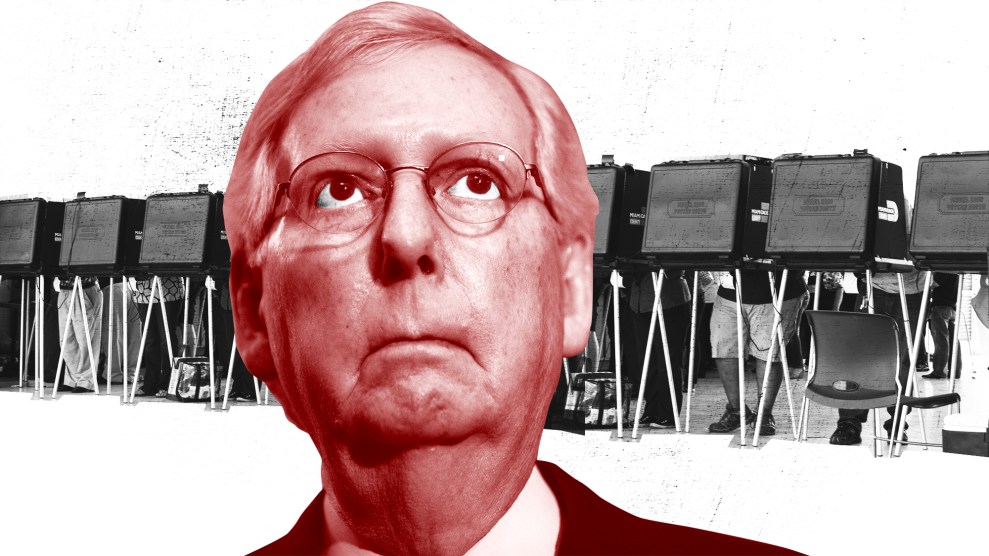
Mother Jones illustration; Timothy D. Easley/AP; Justice for Breonna
Kentucky Attorney General Daniel Cameron is set to make history twice in less than a year. The first time came in November 2019, when he became the first Black person to be elected to statewide office in Kentucky as a stand-alone candidate. The second time is likely just around the corner, when he decides whether to prosecute the Louisville police officers who killed Breonna Taylor, a 26 year old medical worker who was shot during a no knock police raid.
Taylor’s case landed on the attorney general’s desk just as his political career was taking off, one which is expected to reach high places as long as nothing gets in the way. Cameron, the first Republican elected attorney general of Kentucky in more than 70 years, was just 33 years old—and had never tried a case in court—when he won the job. Mitch McConnell helped guide his career. President Donald Trump had taken to calling him a “star.”
But Cameron’s short tenure has already been buffeted by the controversy over Taylor’s killing, and the national protest movement it helped touch off. Now, Kentucky’s brightest young conservative star will decide whether to take on the cops and the system behind Taylor’s death. For those who have followed Cameron’s career, his state, and the implications of the Taylor case, a decision not to prosecute seems all but pre-ordained. “The only way Daniel prosecutes these guys is if there is no way under God’s freaking sun that he can figure out a way not to,” says Ricky Jones, who heads the Pan-African Studies Department at the University of Louisville and taught Cameron when he was in college. (He recalls Cameron as an exceptionally smart, and already conservative, student.)
“The majority of the citizens here, the idea they have of the state is to keep it a mostly monochromatic state with largely mid-20th century social and political sensibilities,” Jones continued. “Daniel Cameron submits to those sensibilities.”
Cameron was still an undergraduate at the University of Louisville when the state’s pre-eminent politician, Senator Mitch McConnell, took him under his wing. After graduating law school, Cameron clerked for a conservative federal judge in Kentucky before joining McConnell, one of Washington’s most powerful Republicans, as counsel. When he announced his campaign for attorney general in 2018, McConnell greased the wheels for his protege, helping him fundraise and taking him to the Oval Office to meet President Donald Trump, where he earned a coveted endorsement on Twitter. It’s common speculation in Kentucky that McConnell, if he wins re-election this year, will not seek reelection in 2026 and work to install Cameron as his successor. “Politically he comes from the Mitch McConnell world,” says Tres Watson, a Republican consultant in Kentucky, adding that the two are “very close and it’s very much a mentor-mentee relationship.”
While stumping for attorney general, Cameron welcomed endorsements from sheriffs, police, and prosecutors, as well as from the state Fraternal Order of Police, whose president boasted that Cameron would “be there for us in the future. Not in the short run, but in the long run.” Cameron frequently touted this endorsement on the campaign trail, saying the attorney general’s job was to ensure the law enforcement community feels “they have a voice in the attorney general’s office.”
During the 2019 race, Cameron made prominent references to the historical significance of his campaign for Black people in Kentucky. For his first television ad, Cameron shared his reverence for fellow Kentuckian Abraham Lincoln in a spot where he said that growing up “it was hard to imagine a little boy who looked like me would some day help a president confirm a Supreme Court justice or even run for attorney general” over footage of Trump swearing Neil Gorsuch onto the high court. In an address as a candidate at the state NAACP convention, he acknowledged that he was not a member of the group. Instead, his political home was a Republican Party that has become increasingly retrograde on issues of race and civil rights.
After winning, Cameron told interviewers he hoped his victory would encourage Black people, regardless of party, to vote and run for office. But as attorney general, Cameron has largely stayed apart from Kentucky’s Black community. The distance has only been exacerbated by the coronavirus and Breonna Taylor’s case, with Cameron drawing criticism from the state’s civil rights leaders.
During his campaign, Cameron promised to “depoliticize” the attorney general’s office, criticizing his predecessor (Andy Beshear, now the state’s Democratic governor) for taking on the state’s then Republican governor, Matt Bevin, and instead promising to focus on crime prevention and drugs. But throughout the coronavirus crisis, under pressure from Kentucky conservatives Cameron has repeatedly asked courts to block Beshear’s executive orders seeking to limit business and church services during the pandemic. In June he urged the GOP-controlled state legislature to limit the governor’s emergency powers during testimony before a state legislative panel. As Kentucky’s coronavirus case count climbed this month, Cameron criticized Beshear for instituting a public mask mandate unilaterally and asked a state judge to decide if the requirement complied with state law.
While Watson says some conservative activists believe Cameron hasn’t gone far enough or acted quickly enough to fight the governor’s public health mandates, his actions are not making him friends among the Black community either. At the end of April, Black pastors and civil rights leaders denounced Cameron’s attempts to thwart such health and safety measures while Black Kentuckians were testing positive and dying at disproportionate rates. “Based on the best data available in Kentucky, Black people make up 8.3% of the state’s population yet we have accounted for 14% of those testing positive for COVID-19 and 22% of COVID-19 deaths,” they wrote in an open letter. In Lexington, the state’s second largest city, the disparities were even more shocking: Black people make up just 15 percent of the population, but account for 55 percent of deaths from the virus. Black Kentuckians “deserve better from Daniel Cameron,” they wrote, saying he had chosen to “align himself with actions which have been, will be and are detrimental to the Black community.”
Taylor died in the early hours of March 13, when three officers served a no-knock warrant at her apartment in the middle of the night. Believing an intruder had entered the apartment, Taylor’s boyfriend fired his gun, striking an officer’s leg. The police returned fire, fatally wounding Taylor. A lawsuit filed by Taylor’s mother against the officers alleges that the cops, who entered the apartment with a battering ram, did not announce their presence. The Louisville Metropolitan Police Department claims the officers knocked several times and announced they were police.
The Kentucky attorney general’s office inherited the case two months later, after a local prosecutor recused himself. Cameron declined to hand the case to a special prosecutor, leaving all decisions about charges arising from the incident in his hands. He has also declined to give a timeline of when he will announce a decision about whether to prosecute the three officers whose no-knock warrant led to Taylor’s death. In a June press conference, Cameron asked for patience while his office investigated the case. But for many that patience, more than four months after Taylor’s death, has run out.
Cameron has increasingly become the target of protesters’ ire. What started as hashtags and petitions became a July sit-in on Cameron’s front lawn. Cameron asked the cops to remove the demonstrators from his property, leading to 87 protesters being arrested and charged with felonies. Cameron himself didn’t object to the felony charges, but a local prosecutor later dropped them “in the interest of justice and the promotion of the free exchange of ideas.”
“I recognize the importance of being the first African-American attorney general, the first African-American to be independently elected,” Cameron said after the protest. “And so this case in particular, because of the individuals involved, Ms. Taylor in particular, I recognize the importance of making sure we get this right. That is my duty as attorney general. As a Black man, I certainly have that responsibility as well to get this right and I’m hopeful people will respect the decision that is rendered by this office once we conclude our thorough investigation.”
“It’s a tough one for him personally,” says Watson, who says he thinks Cameron will go where the law takes him in deciding to prosecute. “I would assume, just knowing him and the way that he operates, that he very much grasps the gravity.”
But since Cameron assumed the case, attorneys for Taylor’s family have implicated other officers and officials higher up the chain of command, making it harder to imagine the attorney general will choose to prosecute. The family’s legal team has submitted a series of court filings outlining a complicated and scandalous story behind Taylor’s death. What at first appeared to be yet another shooting of a Black person at the hands of police threatens to evolve into a tale that suggests a troubling linkage between powerful forces in the city and the everyday practices of the Louisville’s police department.
A judge signed the no-knock warrant—which the Louisville city council has since banned—on Taylor’s apartment as part of an investigation into two men allegedly selling drugs miles away. In applying for the warrant, detective Joshua Jaynes told the judge that Taylor had received packages for one of the men, an ex-boyfriend named Jamarcus Glover, and that a US Postal Service inspector had verified this arrangement. But there appear to be serious holes in the story police told the judge. Among them is that a senior Louisville Postal Inspection Service official has since revealed that a different law enforcement agency had asked his office to investigate whether Taylor’s home was receiving inappropriate packages in January and that they had concluded “there’s no packages of interest going there.”
In July, lawyers for Taylor’s mother made a serious new allegation: that the raid on Taylor’s home was part of an elaborate plan to hasten a Louisville real estate development project called Vision Russell. Jaynes, the officer involved in the Glover investigation who filled out warrant applications for Taylor’s apartment and four other locations, was from the unit, which purports to target “systemically violent locations.” The five warrants Jaynes applied for on March 12 targeted Glover, who lived in an area slated for redevelopment, but the locations they specified are not known to be hotbeds of violence.
“When the layers are peeled back, the origin of Breonna’s home being raided by police starts with a political need to clear out a street for a large real estate development project and finishes with a newly formed, rogue police unit violating all levels of policy, protocol and policing standards,” the amended complaint claims. “A police unit went on a crusade to target people and homes in a confined area of Elliott Avenue in west Louisville. People needed to be removed and homes needed to be vacated so that a high dollar, legacy-creating real estate development could move forward. One of the primary roadblocks to this unit and the real estate development project was an ex-boyfriend of Breonna Taylor, who rented a home on Elliott Avenue.” In June, after Glover was arrested a second time following the execution of another warrant signed by Jaynes, the home Glover had been renting was purchased by a local agency that aids redevelopment projects for just $1.
The city has denied the allegations. But the filings outline an abuse of power that goes far beyond the conduct of three officers on the night of March 13, raising serious questions about the process of obtaining the warrant, the role of the Place-Based Investigations squad, and even whether the department has been enlisted in a real estate project.
While Taylor’s name has been chanted alongside George Floyd’s and Ahmaud Arbery’s, her case is different. Floyd, who died after a Minneapolis police officer knelt on his neck for nearly nine minutes, and Arbery, who was killed by white men while jogging, both provided a stark reminder of the way racism enables violence against Black bodies. But despite highlighting systemic injustice, the prosecutions are straightforward cases against individuals who acted egregiously. Taylor’s case now threatens to implicate a wider system. While a public official like Cameron might be more amenable to prosecuting one bad apple, it is a very different decision—both legally and politically—to prosecute a case that could reveal deeper and broader failures.
“The Taylor case speaks to much more insidious systemic problems than the Floyd case does,” says Jones, adding that “people can make the argument that the police did everything right. People do make that argument.”
Cherie Dawson-Edwards, who chairs the University of Louisville’s department of criminal justice, says that if police deceived the judge while obtaining the warrant, it is likely to be a common practice in the city. “It can’t just be for this case,” she reasons, arguing that would make it all the harder to prosecute officers who did what is considered reasonable in their department. “If that’s the case here, then that is a bigger cultural problem in our local criminal justice organizations as opposed to a bad apple. This is definitely not a bad apple case. It can’t be written off as that.”
Dawson-Edwards also noted that the officer who applied for the warrant is not, unlike the officers who carried it out, a target of the Taylor family’s lawsuit or the protesters. “How much can we hold you responsible for executing something that someone else got approved?” she asks. While the way the raid was carried out was irresponsible and dangerous—one of the officers has already been fired for indiscriminately unloading his gun into Taylor’s apartment—the officers’ on-the-scene actions appear to be only the final link in an unjust chain of events that led to Taylor’s death.
Kentucky, like many states, has taken some steps in recent years to reform its criminal justice system. Before his campaign, Cameron served as a paid spokesman for the Kentucky Smart on Crime Coalition, a nonpartisan group that reflected a national trend questioning mass incarceration given its high impact on state budgets and taxes. But Kentucky’s modest changes leave it lagging behind many states; Kentucky’s leaders sent a prominent signal about their priorities when the state became one of the first to pass a so-called “Blue Lives Matter” law in 2017, making it a hate crime to target law police officers.
Along with other observers outside of Louisville, Dawson-Edwards says this national moment feels different: “If there was a time for us to rethink and reimagine how we police the police, then this could be it.”
But the Republican Party and Trump have retrenched, likely squelching the chances that GOP elected officials like Cameron will undertake the kind of investigation or prosecution that could lead to significant reforms or oversight.
“My thought is they’ve already fired one officer,” says Jones. “He was the sacrificial lamb. The others walk, and there is no structural change coming out of it. That’s what I think is going to happen. Now, What are going to be the consequences of that?” That part, politics can’t predict.
















